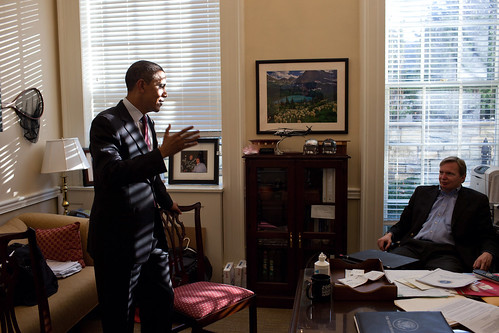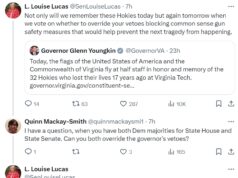 Recently I was a (passive) participant in a conference call between Jim Messina at the White House and Virginia Democrats. It was billed as a “Momentum” call, with an advance advisory that we would be bringing up problems and ideas about the upcoming re-election campaign of Obama for the Presidency, especially in Virginia. Since it was all in the family, so to speak, I expected to hear, and contribute to, some specific political talk in a frank and helpful manner. I was… disappointed.
Recently I was a (passive) participant in a conference call between Jim Messina at the White House and Virginia Democrats. It was billed as a “Momentum” call, with an advance advisory that we would be bringing up problems and ideas about the upcoming re-election campaign of Obama for the Presidency, especially in Virginia. Since it was all in the family, so to speak, I expected to hear, and contribute to, some specific political talk in a frank and helpful manner. I was… disappointed.
The entire call was like coach’s pep talk at half-time when things look a little shaky for the home team—– or, better perhaps, a corporation staff meeting where a vice-president rolls out a supposedly new/old program, and all subordinate functionaries, whatever their secret opinion of the program, brown nose like crazy to earn points for their blind loyalty. In other words, kabuki theater.
It went sort of like this: a fulsome introduction of Mr. Messina; Mr. Messina then gave a short talk about Mr. Obama’s accomplishments in his first term and segued into the upcoming re-election after commenting very discreetly on the losses in 2010, which made it even more important that we all pull together to save the country and re-elect Barack Obama; he knew the President could count on his friends in Virginia, who were also going to vote Tim Kaine into the Senate at the same time (each would apparently reinforce the other); finally, he said it was time for questions, which we could ask by punching “1” and waiting to be called on. I kept quiet, to see what happened
One after another various Virginia party functionaries and elected officials (including Congressman Gerry Connolly) made cheerleading quotes about how hard we were going to work to repeat Obama’s ’08 conquest of Virginia, what did Jim need from us? After several speakers followed this formula, I realized every one, including Mr. Messina, was carefully avoiding mention of the drubbing Democrats took in ’09 and ’10 in Virginia, and most especially any reason for the Democrats’ complete lack of enthusiasm in ’09, and how that little problem might be addressed in ’12. Had it become the Conventional Wisdom that the losses were due to one of those cyclical waves, that it was simply the Republicans’ turn, that Deeds ran a poor campaign, and the grassroots Dems would all enthusiastically come home in ’11 and ’12 (having no place else to go, that is)? I had my finger posed above the “1” button, thinking Mr. Messina needed to hear about the grassroots’ enthusiasm gap, in contrast to the rah-rah pumping by the party functionaries, when Mr. Messina announced, “One more question, I’ll take Mike.” Mike was basically more of the same. End of call.
Either I misunderstood the advance billing of the purpose of the call, or no one in the Virginia hierarchy wanted to let the head office know there might be a problem or two in Virginia—- in the sort of CYA-and-hope-for-the-best scenario, say, with which Ford employees greeted the introduction of the Edsel.
Do we have a gap between the perceptions of the national leadership and the boots-on-the-ground grassroots in the Democratic Party? While it is probably true that many uneasy, unhappy, disappointed, or disgruntled Democratic voters will indeed finally bother to vote, and vote for Barack Obama in ’12, rather than for whatever candidate the Republicans may finally select, I also believe that a surprising number of them will not turn out to work for Obama’s re-election, much less grab strangers on the street to convert them, or to register them.
These are exactly the groups of theretofore unengaged possible voters in 2008 who astonishingly became suddenly visible and kicked butt, but were disappointed and depressed by how Obama conducted himself thereafter—- and I do not mean because he turned out to govern more moderately than his campaign rhetoric, nor do I refer to the unholy constellations of problems which assailed and diverted him immediately after his election. I really believe most of the grassroots gets that part. They were disappointed and turned off by something else, I suspect, something beyond simply the poor economy, which is a well-known rationale for turning against whoever is in office.
Who are these groups of Virginia voters slipping from the grasp of Obama and the Democratic Party? They are pretty much the same groups nationally, as well, and they were outlined on 1 May by Steve Singiser in a shrewd analysis of a recent Daily Kos/SEIU State of the Nation poll, which shows a severe drop in the President’s approval rating nationally among the following groups, ranked from lowest to highest drops, based on 2008 exit polls compared to poll results last week:
1) Latino voters, whose 2008 approval/disapproval of Obama went from 67/31 in November 2008 to 55/42 in April 2011. Even more significant, Republicans in the mid-terms saw their “vote share tick up to 38 percent” among Latinos, “well over the 31 percent that McCain managed in 2008.”
2) Independent voters,(tie) however they are defined, who went from 52/44 in 2008 to 37/54 in 2011. The rise of tea baggers, supposedly separate from “real” Republicans, has muddied the concept of Independent Voter, so the apparent drop may not have much to do with Obama’s political performance.
3) African-Americans, (tie) which went from 95/4 to 82/16, a little surprising but not much for Obama to worry about—- of all the groups, this one will probably “return to form” by November 2012.
4) Earners of between $30-50K per year, who dropped from 55/43 to 41/55. “Most, if not all, of the President’s drop in support, comes from voters making $50,000 or less per year. If that doesn’t scare the hell out of the President’s re-election crew, it should.”
5) 18-29 year old voters, whose approval/disapproval of Obama went from 66/32 in 2008 to 45/44 in 20ll. These voters really were the invisible who became visible in utterly unprecedented numbers, but “the proportion of young voters staying involved in the process has dropped precipitously (having gone from 18 percent of the electorate in 2008 to just 12 percent in 2010), and Republicans have become more competitive” here, as they have among Latinos. “The President now draws a net positive approval of this demographic of just a single point, an eye-popping thirty-three point drop since 2008.”
6) Earners of less than $30K per year, who went from 64/33 to 43/49, a net loss of 37 points. In fact, when it comes to support for Obama by income groups (see number “4” above), most of the drop in his support does come from those earning less than $50K, since in the $75-$100K the drop is just one percent, and there is no net change at all in those earning over $100,000.
As Mr. Singiser points out, “those voters earning under $50,000 have arguably been the ones most endangered by the lengthy economic slump.” They fit the Conventional Wisdom which says a bad economy always punishes a sitting President, especially when the recovery is sluggish, as it is now. Singiser looks at this and wonders how “debates about deficit reduction and austerity measures are going to play these two groups,” who have come out “three to one in favor of raising taxes on the wealthy, rather than privatizing Medicare.” It is the economy, stupid, and period.
Ummm, maybe in one way it is, and it behooves the Democrats and the President to “pick a few fights” with obdurate Republicans between now and November 2012, in order to remind lower-income voters “exactly who is on their side.” However, there is something more going on, IMO, which underlies and informs the economic dissatisfaction. Americans desperately wanted “change” when they voted for Obama, change far beyond merely a return to civility. We had experienced over 30 years of Republican free market economic policies, ever since Reagan (even under Clinton, with NAFTA, for example), and it had brought us a tectonic change in America’s social and economic landscape: intractable deficits, a growing canyon between the incomes of the top vs. the bottom, the gutting of America’s industrial base, several increasingly rough recessions and “readjustments,” wars, and all the other litany of social and economic ills of a banana republic. All this took the heart out of our natural optimism and made many talk about “the end of America.” Popular wisdom was: America has been going in the wrong direction.
The “change” Obama delivered looked very much like more of the same ol’ same ol’ Republican free market theories, perhaps a little less ruthless and more user friendly than the class warfare Republicans wanted, but in point of fact, they can be described as Republican Lite, implemented by the same ol’ same ol’ Inside-the-Beltway and Wall Street crowd familiar from past administrations—– no new faces, no new ideas. There was no New Deal, no questioning or even, heaven forbid, modification of purist free market theory, much less a basic restructuring of Wall Street or global corporate fiefdoms. No real jobs policy. No industrial policy. No social justice. Even more frustrating, in his signature issue of health care, Obama showed almost no political leadership from the get-go, much less acting in ways that would strengthen his own political party and his so-called base—– indeed, at times it must have seemed to Congressional Democrats that their own President did not have their back. Those new voters, categories 1-6 (above), became disgusted, disappointed, turned off, and so they tuned out. “Politicians’re all the same, nothing’s changed.” Still the popular wisdom: “America is going in the wrong direction.”
President Obama, unlike candidate Obama, did nothing to change the terms of the debate, all his presidential rhetoric and all his negotiations were conducted within the same, tired Republican frames, the same frames the voters had wanted changed. The Republicans decided the national deficit was The Issue; Obama went along. The Republicans decided cutting the national budget and “entitlements” was The Answer; Obama went along. It is, therefore, not surprising a resurgent Republican Party swept the ’09 and ’10 elections; why stick with Republican Lite, when you can have the real deal, since that was the choice voters thought they had; they’d asked for real change, and felt betrayed. It predictably became the Conventional Wisdom that the election results “proved” that Obama had to move to the mythical middle (an indefinable, moving target, by the way) to save himself—- so, what else is new in pundit-land?
The Obama base which worked its tail off to get him elected, was dismissed as “the professional left,” and it was smugly agreed among his “professional advisors” that the economy is plainly the issue, and, while Obama would have to throw that base a hush puppy or two in the run-up to 2012, he would be well-advised to do it with his customary rhetoric, but not actually follow through in real life, not if he wanted to garner any significant funding from the mega-donors, not if he wanted actually to be re-elected. In other words: more of the same, with a tid-bit or two of so-called leftie garnishments.
Well, Yes, it is the economy, but not quite the way the professional advisors think. There is no chance Republicans will co-operate with Obama to do anything to improve the economy under his administration, quite the opposite. Even if the President now draws “lines in the sand,” on budgets, deficits, social programs, we still are not hearing any direct challenges to the Republican framing of the issues, nor even to the Republican choice of issues. Besides, how can we trust Obama to follow through once he is re-elected, after our experiences during his first term?
The way I see it, the wild Republican depredations and craziness alone will not convince those 6 categories of unhappy voters, nor even the grassroots Democratic base, that Obama deserves their loyalty. The only thing that will do the trick is a fighting change in the terms of the debate, offering a clear choice of a different political and economic theory, exemplified by some innovative new policies, both civilized and progressive. Even just modifying the famous free market theory would help; moving toward the right/middle will not help. Fail to re-invent real change and, well, bullies and jungle Darwinism will win, and Obama will lose, even if his special forces were more successful in offing Osama bin Laden than Jimmy Carter’s were in rescuing the hostages in Iran.


 Sign up for the Blue Virginia weekly newsletter
Sign up for the Blue Virginia weekly newsletter

![Tuesday News: “Johnson gambles on plan separating Israel aid from Ukraine funds”; “It Took One Day for Trump to Get in Trouble at His First Criminal Trial”; “If [Youngkin] wanted to write bills, he should have run to serve in the General Assembly”](https://bluevirginia.us/wp-content/uploads/2024/04/trumptrial-238x178.jpg)




![Sen. Mark Warner: “The best time to [pass aid to Ukraine] would have been months ago. The second best time is right now.”](https://bluevirginia.us/wp-content/uploads/2023/02/warner0207-100x75.jpg)
![Audio: Del. Marcus Simon Says “If it takes electing a Gorka [as Fairfax GOP Chair] to…wake people up to [the fact that THIS is who Fairfax Republicans are], then I’m a BUY on that!”](https://bluevirginia.us/wp-content/uploads/2024/04/gorkamontage-100x75.jpg)
